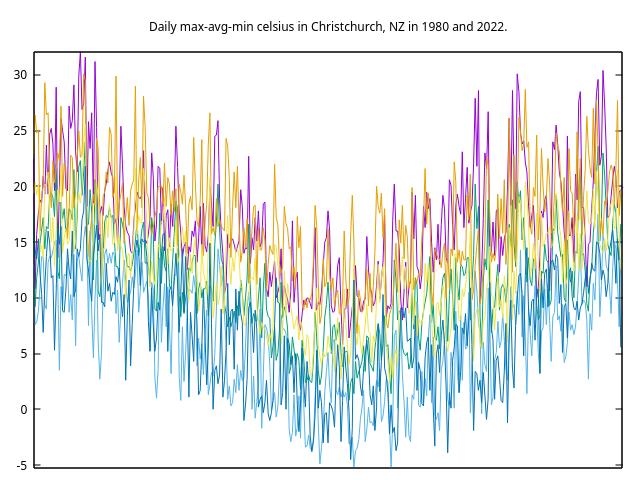One of my most-useful-to-me pages common lisp simple gnuplot which even got included in Edrx’s emacs eev resources, kitten says basically no-one has visited.

Here, in preparation for the show tomorrow, I fed thirty megabytes of New Zealand climate data to it and asked it how hot 1980 was day-by-day in Christchurch, New Zealand. (Do you have an idea for a cooler graph?).
Tell me on the Mastodon (Before The Live Show In 15 Hours).

The data comes from data.mfe.govt.nz.
(gnuplot
"Daily max-avg-min celsius in Christchurch, NZ in 1980."
(get-daily-temps 1980
"Maximum"
"Christchurch (Canterbury)")
(get-daily-temps 1980
"Average"
"Christchurch (Canterbury)")
(get-daily-temps 1980
"Minimum"
"Christchurch (Canterbury)"))
Find cl-series split-sequence and the prev. temperature zip your self, sorry!
This was my exploratory Series declarative lazy programming. I will do a cleaned up version of this post after the show if anyone is interested. I kinda ran out of time. It is pretty cool!
My intent was to super-simply look-directly-at publically available metric pronouncements by the New Zealand government, for example. I ran out of time to do a bigger analysis myself before tomorrow.
(eepitch-shell)
mkdir -p ~/common-lisp
cd ~/common-lisp
git clone http://codeberg.org/screwlisp/screwlisps-knowledge
cd
mkdir -p ~/temps
(eepitch-sbcl)
(eepitch-kill)
(eepitch-sbcl)
(asdf:load-system :series)
(series::install)
(asdf:load-system :split-sequence)
(use-package :split-sequence)
(asdf:load-system :screwlisps-knowledge/simple-gnuplot)
(use-package :screwlisps-knowledge/simple-gnuplot)
(defun date2utime (date-string)
(let ((list (split-sequence #/ date-string)))
(apply 'encode-universal-time 0 0 0
(mapcar 'parse-integer (reverse list)))))
(defun get-daily-temps (year metric place)
"
year should be an integer in the range of about (1922 2022)
metric one of
\"Average\" \"Maximum\" \"Minimum\"
Place one of
\"Lake Tekapo (Canterbury)\"
\"Christchurch (Canterbury)\"
\"Timaru (Canterbury)\"
Returns a fresh list of
(seconds-into-the-year temperature-in-celsius)
specifically from
~/tempts/daily-temperature-30-sites-state-1909-2022.csv
"
(let* ((lines
(scan-file
(merge-pathnames
#P"daily-temperature-30-sites-state-1909-2022.csv"
#p"~/temps/")
#'read-line))
(lists (#Msplit-sequence (series #,) lines))
(data (choose (#Mnot (#Mzerop (scan-range)))
lists))
(lake-tekapo (choose (#Mequal (series place)
(#Msecond data))
data))
(%lt-averages (choose (#Mequal
(series metric)
(#Mfourth lake-tekapo))
lake-tekapo))
(lt-averages (choose
(#Mnot (#Mequal (#Mfifth %lt-averages)
(series "NA")))
%lt-averages))
(utimes (#Mdate2utime (#Mthird lt-averages)))
(celsiuses (#Msplit-sequence (series #.)
(#Mfifth lt-averages)))
(truncated (#Mparse-integer (#Mfirst celsiuses)))
(decimal (#M/
(#Mparse-integer
(#Mor (#Msecond celsiuses) (series "0")))
(#M* (series 10.0)
(#Mlength
(#Mor (#Msecond celsiuses)
(series "0"))))))
(points (#Mlist utimes (#M+ truncated decimal))))
(sort
(collect
(choose
(#M< (series (encode-universal-time
0 0 0 1 1 year))
utimes
(series (encode-universal-time
0 0 0 1 1 (1+ year))))
points))
'<=
:key 'car)))
This is basically how we are going to access the csv.
(let* ((lines
(scan-file
(merge-pathnames
#P"daily-temperature-30-sites-state-1909-2022.csv"
#p"~/temps/")
#'read-line))
(lists (#Msplit-sequence (series #,) lines)))
(collect-first lines))
being:
("WKT" "site" "date" "statistic" "temperatur" "lat" "lon" "site_simpl"
"GEOMETRY_X" "GEOMETRY_Y
")

In this case, orange, yellow and magenta were 2022.
To get two years in the same place.
(defun decf-t0 (list)
(loop
:with t0 := (caar list)
:for l :in list
:do
(decf (car l) t0)
:finally
(return list)))